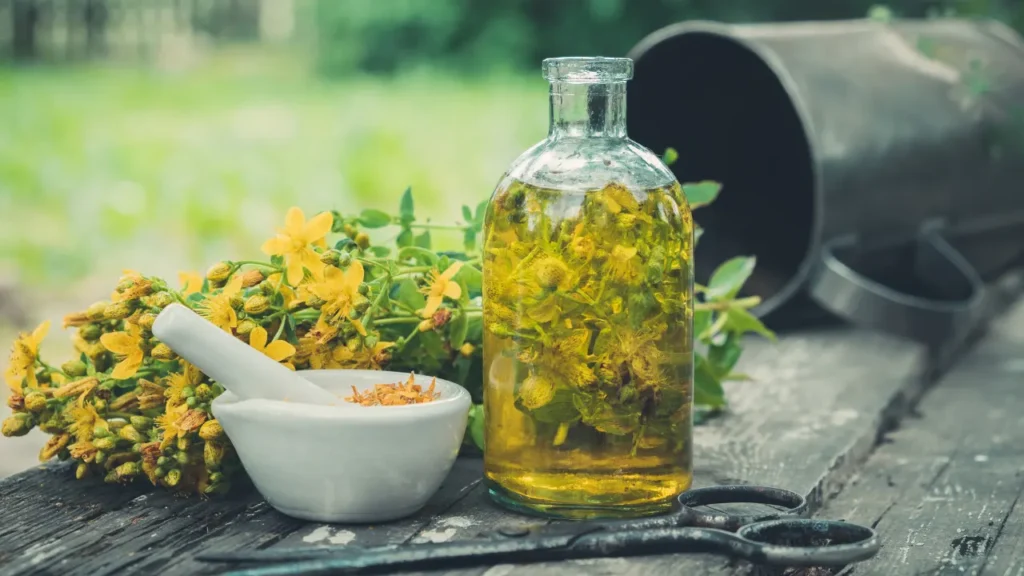Hypericum perforatum once could only be found in parts of Europe and Asia. This plant, also sometimes known as St. John’s wort, is now a perennial herb that grows naturally in temperate zones all over the world. St. John’s wort can be easily recognized by its vivid yellow blossoms and has been utilized for many years in traditional medicine to treat a wide range of conditions.
The plant has the ability to alleviate mild to moderate depression as well as improve cognitive abilities. The purpose of this page is to provide a thorough explanation of the responsible use of St. John’s wort, particularly as a nootropic supplement, by exploring its nature, health advantages, ideal dosages, adverse effects, and potential substance interactions.
You May Also Like:
CBD for Concentration: 3 Epic Benefits that Boost Your Focus
CBD for Concentration: The Productivity Hack for Energy and Focus
St. John’s Wort: Benefits, Dosage, Side Effects, Drug Interactions, and Other Important Information is an original (NootropicsPlanet) article.
Nature of St. John’s Wort
St. John’s wort can grow up to one meter tall and spreads easily in untamed, grassy places. The yellow blooms of the plant are clearly recognizable as they have many tiny oil-producing glands visible as black spots on the petals and foliage.
The active ingredients of the plant, such as hypericin and hyperforin are found in those glands, which contribute to its medicinal properties. The scientific world is still interested in and researching St. John’s wort because of its adaptability in treating a variety of ailments, particularly its effectiveness in managing depression and its role as a natural nootropic for cognitive enhancement.
Health Benefits of St. John’s Wort
St. John’s wort has been extensively studied for its potential health benefits, particularly in the context of mental health and well-being. Here are some of the key benefits associated with this herbal supplement:
Antidepressant Effects: The most well-established advantage of St. John’s wort is its capacity to mitigate mild to moderate depressive symptoms. According to clinical research, St. John’s wort may have fewer adverse effects and be just as helpful for certain people as prescription antidepressants. The herb’s ability to elevate mood is thought to be attributed to its effects on neurotransmitters such as norepinephrine, serotonin, and dopamine.
Anxiety Reduction: St. John’s wort has been shown to have anxiolytic (anxiety-reducing) qualities in addition to its antidepressant effects. However, its property in alleviating anxiety might be lesser than that for depression.
Symptoms of Menopause: According to preliminary studies, St. John’s wort may provide a natural alternative for symptom management by reducing menopausal symptoms like mood swings and hot flashes.
Anti-inflammatory and Antimicrobial Effects: St. John’s wort flavonoids and other components have antibacterial and anti-inflammatory properties. When used topically, these characteristics may help the herb heal cuts on the skin, soothe small burns, and treat certain skin disorders.
Neuroprotective Properties: The use of St. John’s wort may be advantageous in preventing neurodegenerative illnesses. Further research is needed to fully understand the processes underlying these effects, however, as they may involve the herb’s antioxidant properties and its impact on neurotrophic factors.
Relief from Somatic Symptoms: St. John’s wort has been shown in certain studies to be useful in treating physical symptoms, such as stomach problems and chronic pain, which are frequently connected to depression.
Although St. John’s wort has promising health advantages, especially for sadness and anxiety, it is crucial to practice caution when using it. St. John’s wort’s safety and efficacy can differ according to the patient, the ailment being treated, and whether or not there are any coexisting medical conditions or drugs. Consequently, speaking with a healthcare professional before beginning supplementation with St. John’s wort is essential.

Chemistry of St. John’s Wort
St. John’s wort (Hypericum perforatum) is chemically rich, containing a variety of bioactive compounds that contribute to its therapeutic effects. The two primary active components hypericin and hyperforin are believed to be responsible for most of its medicinal properties.
- Hypericin is a naphthodianthrone, a class of compounds that contributes to the plant’s characteristic red pigmentation. Hypericin is thought to play a role in the plant’s antidepressant and antiviral activities, though its exact mechanism of action is still under investigation. Hypericin is photodynamic, meaning it becomes active in the presence of light, which is linked to its antiviral properties and also explains the photosensitivity side effects seen in some individuals taking St. John’s wort.
- Hyperforin is a prenylated phloroglucinol derivative and is considered to be a major contributor to the antidepressant effects of St. John’s wort. Hyperforin is particularly interesting due to its ability to inhibit the reuptake of several neurotransmitters, a mechanism not commonly found in other natural or synthetic antidepressants. It has a broad spectrum of action, affecting serotonin, norepinephrine, dopamine, GABA, and glutamate neurotransmitter systems.
Besides, St. John’s wort contains a complex mix of flavonoids (like rutin, quercetin, and kaempferol), which have antioxidant properties and may contribute to the anti-inflammatory effects of the herb. Tannins, phenolic acids, and essential oils found in St. John’s wort also contribute to its therapeutic profile, providing antimicrobial, antiviral, and possibly neuroprotective benefits.
Physiological Mechanism of Action of St. John’s Wort
The physiological impact of St. John’s wort is multifaceted due to the variety of bioactive components in St. John’s wort. These components are involved in several biochemical pathways that contribute to its therapeutic effects, particularly in the context of depression and cognitive enhancement.
Neurotransmitter Reuptake Inhibition: Serotonin, dopamine, norepinephrine, GABA, and glutamate are just a few of the important neurotransmitters in the brain that are affected by hyperforin. Hyperforin enhances neurotransmission and may benefit mood and cognitive abilities by preventing the reuptake of these neurotransmitters and increasing their availability in the synaptic cleft. Its unique broad-spectrum activity sets St. John’s wort apart from other antidepressants, which usually focus on particular neurotransmitter systems.
Modulation of Neurotrophic Factors: The expression of neurotrophic factors, including brain-derived neurotrophic factor (BDNF), may be influenced by St. John’s wort, according to available data. Neuronal survival, growth, and function in the brain are all significantly influenced by BDNF. St John’s wort may support neurogenesis and synaptic plasticity by regulating BDNF levels. Depressive disorders and cognitive decline are known to impede these processes.
Anti-inflammatory and Antioxidant Effects: St. John’s wort contains flavonoids and other phenolic chemicals that have potent anti-inflammatory and antioxidant properties. By reducing oxidative stress and inflammation in the brain, it can support neuroprotection and prevent the onset of a number of mood and cognitive disorders.
Photodynamic Action: When hypericin is exposed to light, its photodynamic qualities become active. This has potential therapeutic applications, including treating specific skin disorders and viral infections. But this same characteristic also accounts for the photosensitivity that some St. John’s wort users have noticed, so when using it, exercise caution when exposed to the sun.
In general, St. John’s wort’s chemistry and physiological mode of action demonstrate its promise as a treatment for depression and cognitive improvement. Because of its intricate relationships with the body and brain, anyone thinking about using it should take great care to evaluate the dose, possible adverse effects, and combinations with other medications.

Optimal Dosage of St. John’s Wort
The best way to take St. John’s wort depends on how it’s prepared and how each person responds to it. Clinical trials have frequently employed doses of standardized extract, three times a day, ranging from 300 mg to 600 mg for depression. It is crucial that people speak with medical professionals to figure out the right dosage and make sure the supplement is right for them.
Side Effects of St. John’s Wort
While St. John’s wort is generally considered safe for most people when used in moderation, there are several side effects and safety concerns that users should be aware of:
- Photosensitivity: One of the most notable side effects associated with St. John’s wort is increased sensitivity to sunlight, resulting from the photodynamic action of hypericin. Individuals taking the herb may find themselves more prone to sunburn and skin irritation when exposed to strong sunlight or ultraviolet (UV) light.
- Gastrointestinal Disturbances: Some users report experiencing gastrointestinal issues such as nausea, diarrhea, and abdominal discomfort after taking St. John’s wort.
- Fatigue and Dizziness: Feelings of fatigue, dizziness, and confusion have been reported, although these symptoms are generally mild and temporary.
- Dry Mouth: Dry mouth is a relatively common side effect that can occur in some individuals taking St. John’s wort.
- Interactions with Other Medications: St. John’s wort can interact with a wide array of medications, including antidepressants, birth control pills, anticoagulants (like warfarin), and chemotherapy drugs. These interactions can either diminish the effectiveness of the medications or increase the risk of adverse effects.
- Serotonin Syndrome: Although rare, there is a risk of serotonin syndrome when St. John’s wort is taken in combination with other serotonergic medications. Serotonin syndrome is a potentially life-threatening condition characterized by high levels of serotonin in the brain, leading to symptoms such as confusion, rapid heart rate, high blood pressure, dilated pupils, loss of muscle coordination, and muscle rigidity.

Potential Substance Interactions with St. John’s Wort
The possibility of St. John’s wort interacting with other drugs is one of the biggest worries. Cytochrome P450 enzymes, especially CYP3A4, which is implicated in the metabolism of numerous medications, are activated by the plant. This induction may result in lower co-administered medication plasma concentrations and diminished efficacy. Furthermore, when used with other serotonergic medications, its impact on neurotransmitter reuptake may result in serotonin syndrome.
Best Responsible Use of St. John’s Wort
To maximize the benefits of St. John’s wort while minimizing risks and side effects, it is essential to use the supplement responsibly:
- Consultation with a Healthcare Provider: Before starting St. John’s wort, especially for therapeutic purposes, consult with a healthcare provider to ensure it is appropriate for your condition and will not interact negatively with other medications you may be taking.
- Adhering to Recommended Dosages: St. John’s wort should only be used in the recommended dosages which is typically 300-600 mg of standardized extract three times a day for adults. However, this can vary based on the product and individual circumstances. Do not exceed the suggested dose without medical advice.
- Monitoring for Side Effects: Be vigilant for any side effects, particularly if you have a medical condition that could be exacerbated by the herb. If the side effects are severe or persistent, discontinue its use immediately and consult a healthcare provider.
- Avoiding Sun Exposure: Given the risk of photosensitivity, individuals using St. John’s wort should minimize sun exposure and use sunscreen or protective clothing when outdoors.
- Pregnancy and Breastfeeding: Due to insufficient data on its safety, pregnant or breastfeeding women should avoid using St. John’s wort.
- Children and Adolescents: The use of St. John’s wort in children and adolescents should be under the guidance of a healthcare professional, considering the lack of comprehensive safety data in these populations.
- Regular Review and Assessment: If using St. John’s wort for mental health purposes, regularly assess its effectiveness and any side effects with a healthcare provider to determine if continued use is warranted.
By adhering to these guidelines, individuals can use St. John’s wort safely and effectively, leveraging its potential benefits while minimizing risks.
St. John’s Wort:
Conclusion
In conclusion, St John’s wort may be the right supplement for you if you are trying to reduce depression or the feeling of anxiousness. This plant has an anxiolytic effect as it has been proven to be useful against mild to moderate depressive symptoms. Additionally, the supplement can also be used as preventative care for Alzheimer’s or Parkinson’s since it has neuroprotective properties.
All these properties are attributed to hyperforin which is a bioactive substance of St. John’s wort. However, you should not act recklessly by mixing this supplement with your existing medications if you have any. You need to confirm its safety and dosage with medical experts to know that the supplement would suit your needs.

References:
- Clinical Use of Hypericum Perforatum (St John’s Wort) In Depression: A Meta-Analysis. Retrieved from:https://pubmed.ncbi.nlm.nih.gov/28064110/
- Medical Attributes of St. John’s Wort (Hypericum Perforatum). Retrieved from:https://pubmed.ncbi.nlm.nih.gov/22593920/
- St. John’s Wort – Uses, Side Effects, and More. Retrieved from:https://www.webmd.com/vitamins/ai/ingredientmono-329/st-johns-wort
- St. John’s Wort for Treating Depression. Retrieved from: https://www.webmd.com/depression/st-johns-wort
Important Note: The information contained in this article is for general informational purposes only, and should not be construed as health or medical advice, nor is it intended to diagnose, prevent, treat, or cure any disease or health condition. Before embarking on any diet, fitness regimen, or program of nutritional supplementation, it is advisable to consult your healthcare professional in order to determine its safety and probable efficacy in terms of your individual state of health.
Regarding Nutritional Supplements Or Other Non-Prescription Health Products: If any nutritional supplements or other non-prescription health products are mentioned in the foregoing article, any claims or statements made about them have not been evaluated by the U.S. Food and Drug Administration, and such nutritional supplements or other health products are not intended to diagnose, treat, cure, or prevent any disease.


